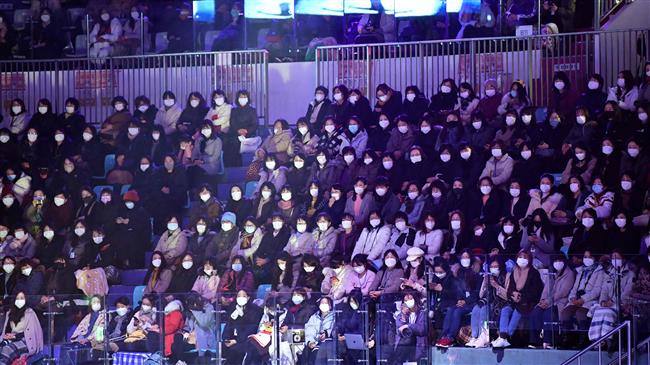
Spectators wear face masks to help prevent the spread of the SARS-like virus that originated in central China as they watch the exhibition gala at the ISU Four Continents Figure Skating Championships in Seoul on February 9, 2020. South Korea has confirmed 27 cases of the new coronavirus virus so far.
The death toll from a coronavirus outbreak in mainland China rose to 908 as of the end of Sunday, the National Health Commission (NHC) said on Monday.
The number of new deaths on Sunday rose 97, the NHC said in a statement on its website, another daily record increase.
The central Hubei province, the epicenter of the outbreak, earlier on Monday reported 91 deaths on Sunday, while in the provincial capital, Wuhan, 73 people had died.
The number of new confirmed infections on mainland China on Sunday increased, after declining on Saturday for the first time since February 1.
Across mainland China, there were 3,062 new confirmed infections on Sunday, bringing the total number so far to 40,171.
On Saturday the virus passed the total 774 deaths recorded globally during the 2002-2003 pandemic of Severe Acute Respiratory Syndrome (SARS).
The virus, which has spread to two dozen countries, has killed some 2% of more than 37,550 cases worldwide, with 99 percent of infections in China, WHO figures show.
The WHO declared the outbreak a global emergency on January 30, days after the Chinese central government imposed a lockdown on 60 million people in Hubei province and its capital Wuhan, epicentre of the virus that emerged in December in a seafood market.
WHO advance team on way to China
An advance team of international experts led by the World Health Organization (WHO) has left for Beijing to help investigate Chinaís coronavirus epidemic, the Geneva-based agency said on Sunday.
WHO director-general Tedros Adhanom Ghebreyesus, who made a trip to Beijing for talks with President Xi Jinping and Chinese ministers in late January, returned with an agreement on sending an international mission.
But it has taken nearly two weeks to get the governmentís green light on its composition, which was not announced, other than to say that WHO veteran Dr. Bruce Aylward, a Canadian epidemiologist and emergencies expert, was heading it.
Dr. Sylvie Briand, who accompanied Tedros last month and stayed behind for talks with top Chinese health officials, told Reuters last week that they were discussing a list of experts with China.
"Because it is a joint mission, they need to be on board, itís not just an international group going there. We have about 15 people," said Briand, director of Global Infectious Hazard Preparedness at WHO.
Tedros said on Saturday that he hoped the team would include experts from the US Centers for Disease Control (CDC).
"It has to be meaningful on the ground," Lawrence Gostin, professor of global health law at Georgetown Law, said in an interview in Geneva this week.
Gostin called for a "genuine partnership with transparent flows of information and accountability for the response", adding that there should be a strong CDC presence.
"CDC has got no peer in terms of its experience and technical expertise in dealing with international outbreaks," he said.
"But the other benefit is the smart diplomacy, what it could signal is that despite all of our differences in ideology, trade, politics, that when faced with a common threat to humanity, we come together as a human community to tackle it," Gostin said.
(Source: Reuters)
LINK: https://www.ansarpress.com/english/13839
TAGS:






























 online news tv
online news tv




